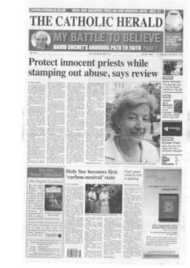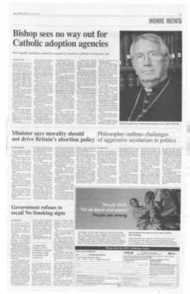Page 13, 20th July 2007
Page 13

Report an error
Noticed an error on this page?If you've noticed an error in this article please click here to report it.
Tags
Share
Related articles
No Need To Say Sorry From Mrs Morag Marioni Sir
Catholics Should Not Feel Guilty For The Inquisition
Spitting In The Face Of God
Inquisition Myths Debunked
Inquisition Was 'legally Justified', Says Official
Inquisition apologists are missing the point
Quentin de la Bedoyere admires a book that details the gruesome crimes of the Holy Office and doesn't use the 'others were worse' defence so often employed by Church historians Inquisition: The Reign of Fear by Toby Green, Macmillan £20 Having been delated twice to the Holy Office for theology that was somewhat before its time I have a natural interest in what might have happened to me 300 years ago. At the least I would have been entitled to a paragraph or two in Toby Green's book and a decent auto-da-fe. Green has been searching through the archives unearthing accounts of the Inquisition in Spain and Portugal, and in their colonies.
The result has been both thorough and gruesome, with a text that consists largely of details summarised from the records. There is occasional analysis but this is not a considered history so much as an anecdotal account, illustrating the course of events between 1481 and abolition in 1834. As the Ossa of horror is piled upon the Pelion of corruption. it is hard to retain a sense of the bigger picture.
Unlike the Papal Inquisition of the 13th century and the Roman Inquisition of the 16th, the Spanish Inquisition was effectively wrested from more benign papal control and became a matter of local church and state.
Despite protests from Rome it continued on its own way — with converted Jews and Moors, or their descendants. as the initial main enemy, to be supplemented later by those with Lutheran tendencies, sexual deviants and others suspected of heterodoxy.
In a society where the sacred and secular were virtually coterminous it is hard to distinguish predominance. My reading, and I think Green would agree, is that it was initially at least a political exercise in creating a powerful and united Spanish nation through extirpating the relics of foreign, and potentially dangerous, elements which had formerly been dominant. The enthusiastic support of the Church provided the rationale and did the bulk of the work.
Modem apologists have argued that the number of executions, at least after the early years, were few (particularly in comparison with the slaughter of witches). that torture was commonly used elsewhere, that anonymous accusations were thought to be necessary to protect witnesses, that the inquisitorial courts tended towards mercy to such a degree that criminals would blaspheme in order to be tried by the Inquisition rather than by the secular courts. that the inquisitors were children of their time.
But all this seems to be beside the point, unless showing that others were worse than you constitutes a defence. For the Church of God, with the gospels in its hand and the Holy Spirit at its shoulder, it doesn't.
The Spanish Inquisition became fundamentally corrupt. It bred a web of officials who abused their power with impunity. It created a widespread climate of fear and suspicion. It developed a network of intelligence through inducing the accused to make allegations against their contacts, their friends and their families.
If any attempts were made to restrain its enormities, the reformer, even one of standing, might quickly find himself next on the list of accused. Its tortures could be so extreme that even the brave were induced to provide whatever information, true or false, the persecutors required. And in the end it executed no one.
For that was conveniently done by the state — a point which the modem Catechism still finds it necessary to make. Which made the loudest noise — the crackling of the flames or the washing of the hands?1 recall that Lady Macbeth had much the same problem.
In the Inquisition we have, mutatis mutandis, the apparatus of the police state. The excusing ideology is not the Aryan ascendancy nor Marxist inevitability but the preservation of the truth — or the power of the Church which, in Spain, was synonymous. Petty officials "drest in a little brief authority", thought-police, spies, voluntary and involuntary informants, barriers to outside information through censorship, torture, lengthy incarceration without trial and an atmosphere of suspicion and fear.
This Inquisition waxed and waned but it lasted for 300 years. It is some consolation that many Spanish Catholics opposed it, and some of the Spanish states refused it.
But the root fault lies in human nature with its innate tendency to do evil under the satisfying banner of good.
It remains with us today, and so we still seek scapegoats it is virtuous to hate. Two of them, the Jews and the Muslims, are the same targets for western society that the Inquisition chose.
The betrayal of the Gospel by the Spanish Church, and there are plenty of other examples in history, remains a stain — and a stick with which our opponents are entitled to beat us. Corruptio optimi pessima — the corruption of the best is the worst.
It is significant that in a recent American poll the percentage of Catholics willing to accept the possible need for torture was significantly higher than the general population. We have not learnt our lesson yet.
Toby Green's book is a salutary but uncomfortable reminder that "power tends to corrupt, and absolute power corrupts absolutely", as Lord Acton wrote of the Renaissance popes.
But the pain of reading might be offered up as a tittle penance for the sins of our forefathers. Or perhaps our own.
blog comments powered by Disqus

















